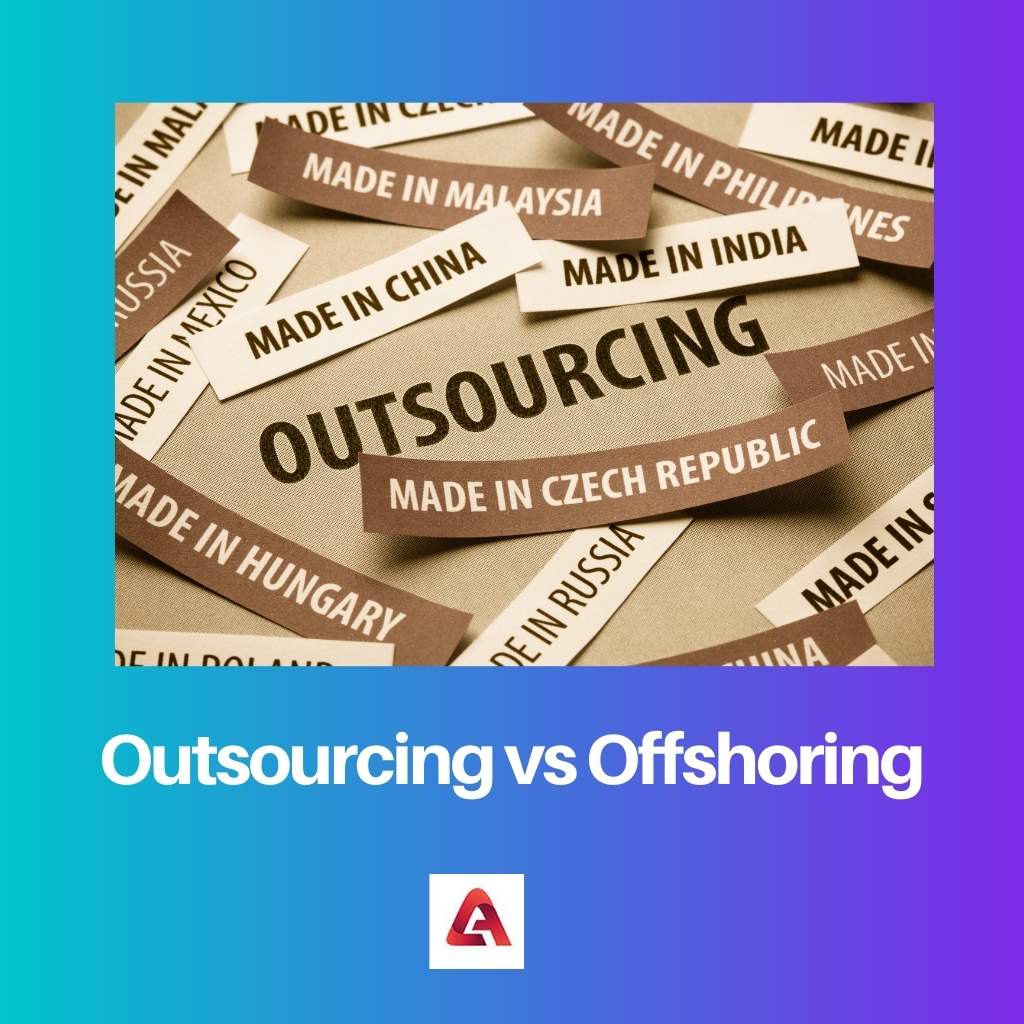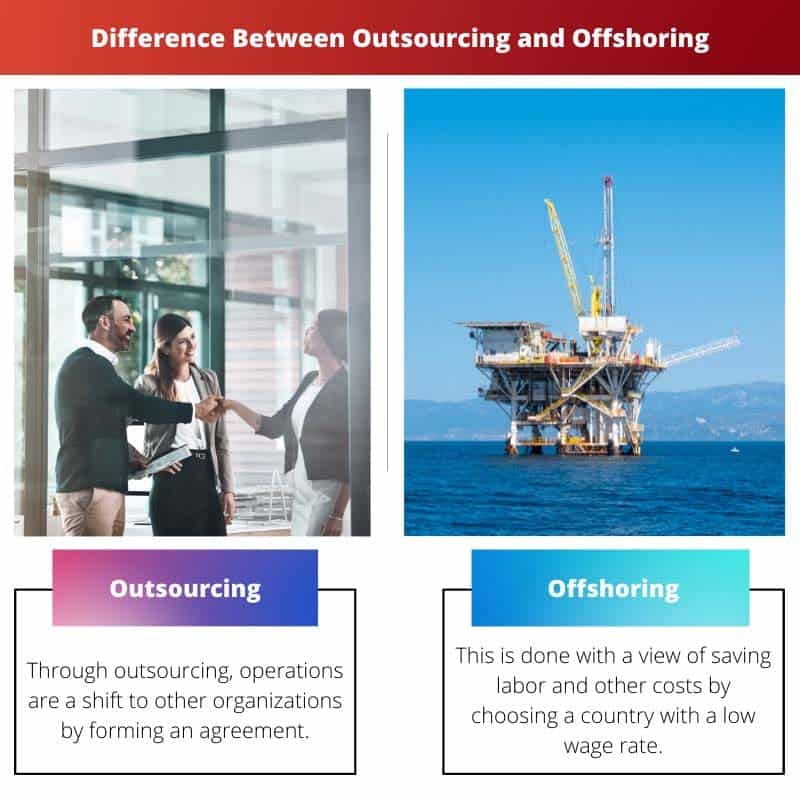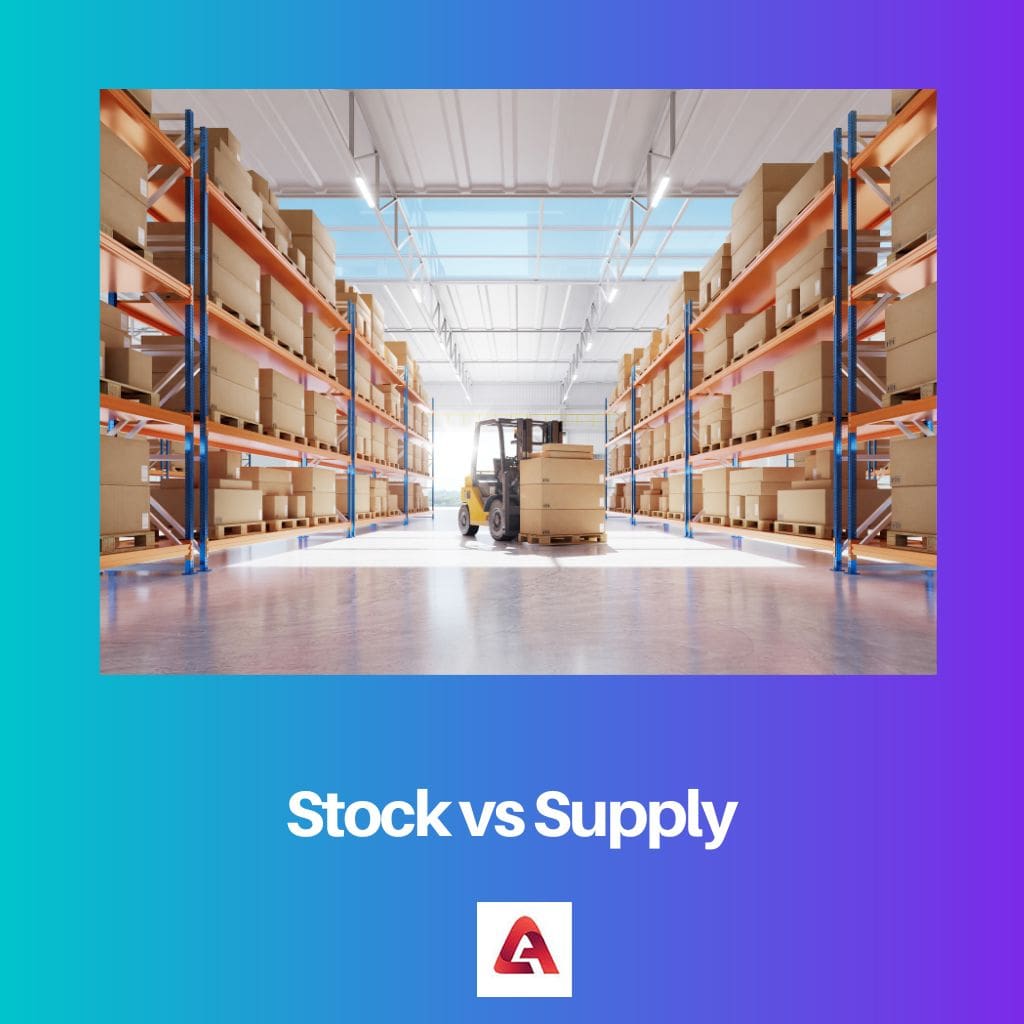A company has to perform several functions to carry out its activities.
Sometimes, these include planning, organizing, staffing, directing, controlling, etc., and it becomes difficult to perform this single handling.
And for that purpose, they hire other people to carry out several activities; this is done under the process of staffing where people are hired.
But sometimes, a company forms an agreement with another company to help out in several activities. This is known as outsourcing. Under this, there is also another term called offshoring.
Both of these terms are similar, and there creates huge confusion.
Key Takeaways
- Outsourcing refers to the practice of hiring a third-party company to perform services, while offshoring refers to the practice of moving operations to a different country.
- Outsourcing can be done within the same country, while offshoring involves moving operations to a foreign country.
- Outsourcing can involve domestic and foreign companies, while offshoring involves specifically foreign companies.
Outsourcing vs Offshoring
Outsourcing is the process by which the activities and operations of a business are shifted to other organizations through an agreement between the two parties. Offshoring is the process of shifting activities or offices with the aim of lowering labour costs, and it is outside the country.

Outsourcing is the process by which the organization comes into contact with other organizations to carry out some activities or functions. The main objective of this process is to focus on the core functions of the business.
The activities in this process are performed by the non-employees. The third organization or party can be situated in the same or different country. This helps in making the operations perfumed fast.
Offshoring is similar to outsourcing, but here the main focus is not the function performed but the cost required for performing these functions.
Under this process, the same activities of the organization are performed in a country with low labour costs by opening a new branch or by coming in a contract with a new organization there.
Therefore this process is mainly carried out to cut the cost of the operations.
Comparison Table
| Parameters of Comparison | Outsourcing | Offshoring |
|---|---|---|
| What it implies? | Shifting operation | Shifting offices or activities. |
| Objective | The focus of core business functions | Lower labor cost |
| Activities performed by | Non-employee | Employees of the organization. |
| Location | Within or outside the country | Outside the country. |
| Involvement of another party | Another party is always involved | Third-party may or may not be involved. |
What is Outsourcing?
Through outsourcing, operations are shifted to other organizations by forming an agreement. The following are the benefits of outsourcing:
- Cost Saving: this process helps organizations to save profits as they form an agreement with other organization with a cheaper cost, this further help in increasing the profit margin.
- Core Strengths: this is the main motive of outsourcing, as many minds can work at a point. This increases the productivity and core strength of the business. While another company is focusing on increasing profits, the former company can focus on maintaining good relations with its customers.
- Quality and capability: when more than one company works together, it increases creativity, which further leads to an increase in the quality of work, and more people mean an increase in capability as well.
- Labour flexibility: outsourcing helps in the increase in labour; therefore, there is flexibility, and work can be done quicker with quality.
This function is done by the organization so they can focus on their main functions or the activities they are best at. Other things or functions are then carried out by the outsourced organization.
There are two kinds of outsourcing that can be done by organizations: Business Process Outsourcing and Knowledge Process Outsourcing.

What is Offshoring?
This is done with a view of saving labour and other costs by choosing a country with a low wage rate. The following are some benefits of Offshoring:
- Cost-saving: this is the main motive of this function. The organization chose a location where the labour rate and other cost is less and therefore opened a branch there to carry out activities at a cheaper rate. This helps them save costs as they sell the products at a higher price in the market than the price of its production.
- Skills: in some cases, along with the cost-saving, the organization also selects a country where the skills are great than others. This provides the best skill in the production process.
- Flexibility: offshoring increases the flexibility of the organization. They can perform several functions simultaneously.
This function is mostly performed by an organization in a developed nation. From there, they shift, or open new organizations in a developing nation as the cost and other expenses are cheaper than in the developed nation.
Along with monetary benefits, they also get other benefits such as less interference from the government, less tax rate, lenient laws, etc. in recent studies, it is observed that this function has also contributed to increasing the gross domestic product of the country.

Main Differences Between Outsourcing and Offshoring
- Outsourcing is a wider and broader term that includes a third party or organization, whereas offshoring is a part of outsourcing or a narrow term that might or might not include the third party.
- There is little or no control of the former organization over the activities that are carried out by the outsourced organization; they are responsible for the completion of those activities and have full control over them, whereas, in the case of offshoring, the organization has full control over every activity of the organization.
- Being a wider concept, outsourcing has three major parts or types they are offshoring, nearshoring, and onshoring, while offshoring is just among many of its parts.
- Another important difference between outsourcing and offshoring is that outsourcing can be done in the same country on in different countries, whereas offshoring is always done in different countries; otherwise, there is no motive for performing offshoring.
- For carrying outsourcing, a contract or agreement has to be drawn to make it legal between both organizations, whereas this is not the case with offshoring. It can be carried out by the same organization by just opening a new branch in a different country.
- Local taxes and other legal formalities are the responsibility of the third party in case of outsourcing, while in offshoring, it is the responsibility of the owner.





